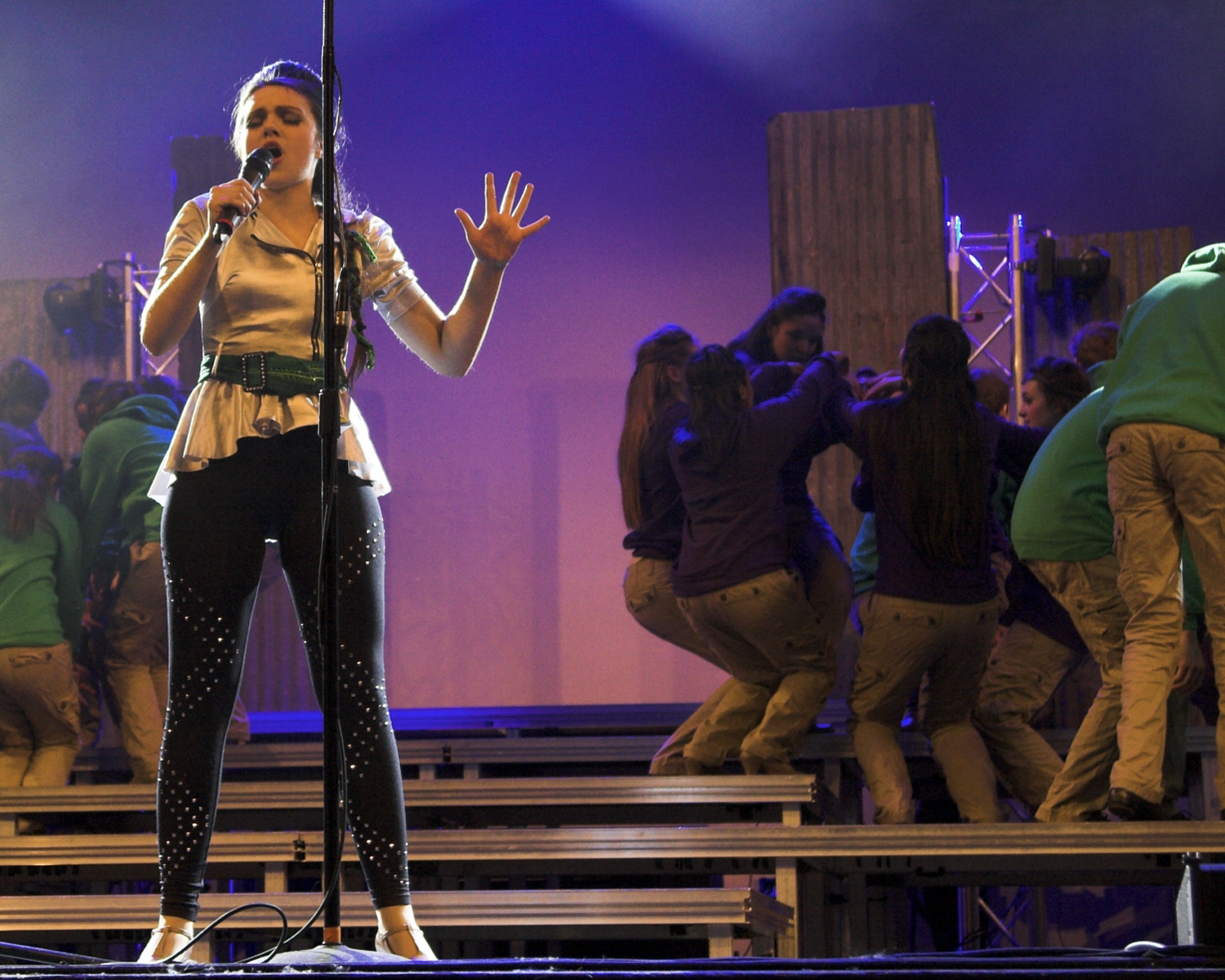
Eric Wyler, Underwood Ultimate
I have long had the conversation with other choir directors, administrators, parents, and students about the importance and purpose of show choir competitions. Some argue that it focuses too much on the trophy and not enough on the education. I disagree. As long as the director keeps the correct “eye on the prize,” show choir competitions can be an educational, meaningful, and memorable experience for all of the performers.
As a member of show choir in high school, I remember the nerves, butterflies, and thrills during the anticipation of walking on stage for the first competition of the season. Once we get on stage and hear the audience burst into applause and cheers, the fears of performing were gone. I was out there with my peers, my friends, my family. We performed as one and strived for greatness. It was not about the trophy; it was about the people, the experience. We enjoyed our time together and were bound to the show choir family that was and still is Papillion-La Vista South Titanium. Now as a teacher, it is more important than ever to keep in mind what the drive and focus was for me as a student in show choir and to give my students that same perspective. The competition process is daunting but very rewarding. Together, the choir must learn how to deal with the stresses that come with memorizing an entire show of choreography and vocals. The bonding of students throughout the entire competition process is unmatched by any other school activity.
When looking for competitions for my show choir, I consider location, judges, and structure of the first round and finals. The competition must be close enough so that my administration will approve of the cost of transportation. I also must consider the travel time and how long I want my choir to be on the bus before we perform that day, especially if we have an early performance time. The judging panel is also very important as they determine the outcome of the awards and I appreciate the feedback given from written comments and critiques. Having an esteemed panel of judges will draw me to certain competitions because I know that I will learn just as much as my students about how to improve and work on the show. Lastly, the structure of the competition schedule and finals are things I look for when considering competitions.
Coming from a small school, I appreciate competitions that allow small schools to be on the same competition level as big schools but also give a fair chance to compete for finals. Some competitions allow the highest scoring small school to compete in finals regardless of their score compared to large schools. Some competitions only allow for small schools to register. It is important for me to have my students feel successful before, during, and after a competition; considering location, judges, and structure are all factored into my decision to commit to a competition.
The most effective competitions run smoothly and efficiently throughout the entire day. Volunteers are easy to find and students are helpful with hosting your room and assisting in any way possible. A fun emcee and a quality concession stand are also very much appreciated as the day can get long for the director, students, and parents. Also, although it is not possible for all venues, performing in an auditorium is most ideal for my show choir. We love to perform on an actual stage with acoustics and a sound system rather than a gym. Gym stages are not the worst thing in the performance world, but a nice auditorium will win every time.
Mark Mercer, Andover, New England Show Choir Showdown
When I look for competitions for my students, I look for two things mainly: I try to find competitions that cycle their judging panel with both new and veteran judges from time to time to keep the panel and the adjudication process fair and fresh. I also look for competitions that invest in their event to make it a positive and electrifying experience. I feel like competitions are meant to challenge us and be a means of striving to be better than who we were at our last competition.
Every choir has put in a lot of work to perform in a competition. Although they may not all be on the same skill level, they all deserve the same amount of care, attention to detail, and fairness throughout the day. As a festival coordinator myself, I make it my goal to make every show shine that takes our stage and for every student that attends to have the best experience possible.
Dianne Holbert, Jackson Prep, Showchoir Masters
The benefits of competition include camaraderie with other groups, fun of competitiveness, feedback from professional judges, confidence builder for students, and preparation for students for the real world because they have to learn to take constructive criticism to improve. When selecting competition venues for my Showchoirs, I like to alternate years and venues close to home first of all. I try to support colleagues and their competitions. I also like to make sure that competitions are run with integrity, and that competitions do not use the same judges in our local area. That has been a problem in the south. I try to ensure that we have judges from across the country and not just from our area. I also like to expose my Showchoirs to competitions where my students can see other Showchoirs from around the country and not just our area so that they can see the Showchoir “culture” that exists everywhere.
The qualities or characteristics of a well-run competition are those that show organization from the registration process through the end of their competition. We have a steering committee who organizes our volunteers in every category needed: for example: internal operations, external operations, hospitality (which is imperative), adjudication, finance, etc. A well run competition covers every area and the director feels very secure with the entire process.
I do need to say that I have experienced a competition that made made me (and the parents working with me) uncomfortable and unwelcome. That is unfortunate because from a personal standpoint, I chose not to go back and expose my students or parents to that. At our competition, we want all to feel our true southern hospitality and have an excellent experience.
Consistent adjudication seems to be a problem in the Showchoir world. I believe that hosts of competitions should all confer and try to be uniform with adjudication. I believe that it might not be a bad idea to have enough judges that dropping the highest and lowest scores would help keep the process fair. I also believe that judges should be able to substantiate their scores so that as directors read them they can also understand why they were given the scores they were. This process should be constructive for directors and students and not a platform for personal opinions.
Bob Mohr, Crete-Monee, SPECTACULAR!
Consider the following as a prioritized flow chart on how to pick a competition. First, look at the judging style of the competition and check for reputable judges with experience. The judges should have real life experience within the show choir world.
Secondly, you will want to find out if there is a finals competition. There are plusses and minuses to both, but essentially if your group can place in the top five or six groups you will have a late night, but you will also have a chance to perform again. Next, make sure the categories fit your show choir. For instance, if your group is a unisex group, but the competition does not have that division, your unisex group will likely have to compete in the open division or preparatory division. Typical divisions are championship, preparatory (groups that are small or do not have a lot of experience), unisex, or middle school.
Finally, the venue that you perform in is a key factor in making a decision on choosing competitions. You will want to find out if the competition is in an auditorium or on a stage and what type of sound, lighting and staging is being provided. The sound equipment provided is especially important on how well your group hears and produces sound. Bigger competitions typically pay to have excellent sound companies. Make sure the staging will accommodate your setup and find out if there are changing areas provided if you have costume changes.
Many of the larger competitions will provide side competitions for you to choose from. These may include solo competitions, dance competitions, concert choir and jazz band. These extra competitions will offer another chance for students to shine, and they will sometimes offer scholarships to show choir camps.
Determine the length of season and when you wish to travel. Keep the locations close if you wish to keep the costs of traveling down. Assess your group and what you wish to accomplish for your season. Take your students to a fairly tough competition at the start of the season, and require your group to watch
Tyler Skidmore, Medina, Medina Showcase
Competing with a show choir is a risk, but in my experience it is an important risk to take. Traveling to a competition with Encore involves a large investment of money and time, but my approach as a director can make or break the experience for the students. While I want to avoid overemphasizing the act of competing, it makes a great motivator. When approached correctly, show choir competitions serve to keep directors and students sharp, provide new opportunities for students and audiences to have moving musical experiences, and offer students unforgettable team-building opportunities.
When selecting competitions, of course driving distance and schedule matter; I look for events that put the student experience first.
Is the performance space well managed and safe? Are the adjudicators able to give educational, constructive feedback to our show, regardless of style? Do we get feedback from adjudicators we don’t typically see? Does the competition respect our time by sticking with the schedule as much as possible? Will the students have the opportunity to watch other show choirs? Are the non-performance elements handled well – friendly and accommodating volunteers, adequate food and host room space?
All of this said, I find that even if the competition goes awry on the day of the event, friendly hosts and the right perspective for my students and me can help to make the weekend a positive memory.










